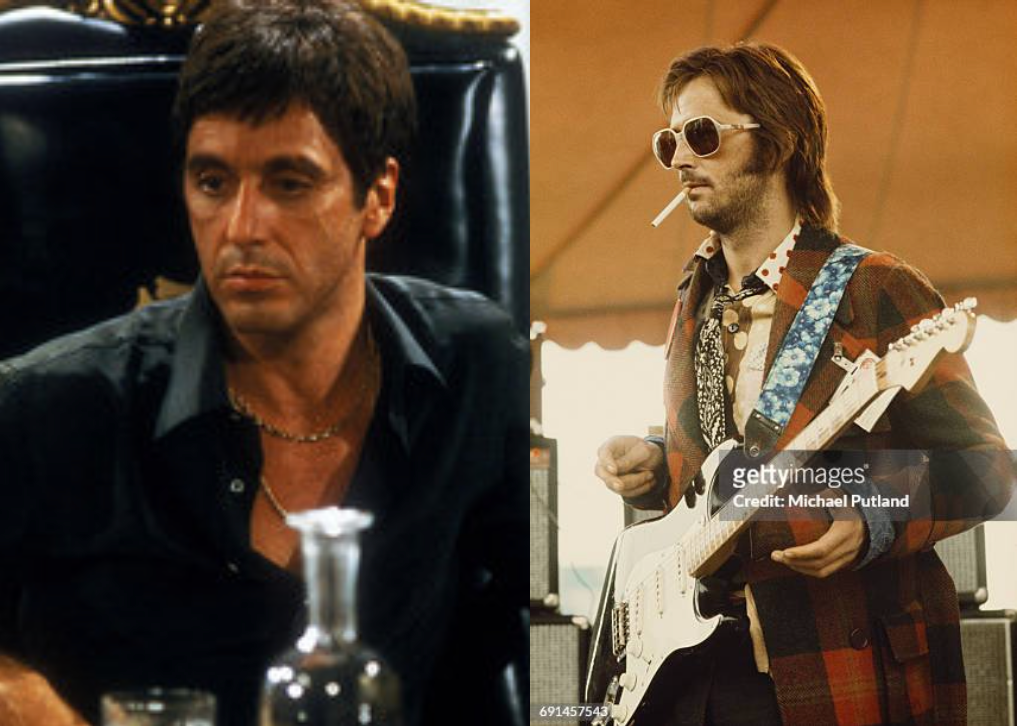From hell raisers to sober sages.

Guitar legend Eric Clapton and acting great Al Pacino are regarded as two of the most successful and influential artists of the 20th century.
From stratospheric early career success, both have endured and reached greater achievements as they matured.
But this almost didn’t happen.
Due to their alcoholism and drug addiction, their lives were nearly burnt out prematurely.
The Party Years
Clapton and Pacino, now clean and sober for multiple decades, are a far cry from their former selves.
During the heady height of their careers in the 1970s, they were both so consumed with addiction that they could barely focus on their professional work.
And denial and arrogance around their addiction led to bad choices in their work.
Clapton didn’t make music for three years due to his raging heroin addiction.
Pacino said in his interview with the late Larry King that he initially turned down ‘Dog Day Afternoon’, which he was nominated for the Academy Award for Best Actor in 1975, because of alcohol.
It was only when Pacino’s manager, Martin Bregman, convinced him to stop drinking for a bit and then read the script that Pacino realised his utter mistake in turning it down.
Unscrambled Brains
“Every addiction starts with pain and ends with pain.” ~ Eckhart Tolle
When we are in the midst of our addiction, our self-obsessed thinking really compromises our ability to make good rational choices. And we aren’t even aware of it!
As Pacino explains to King,
‘It takes a while to unscramble your brain.’
In fact, Pacino’s good friend and mentor, Charlie Laughton, had begged Pacino to stop drinking. Not to stop forever but just to give it a pause so he could reevaluate his life from a sobriety standpoint.
Pacino tells King:
‘Charlie was the one who said to me, “Al, I’m not asking you to stop or do anything, but to be aware that you are actually drinking and taking stuff.”’
Clapton was no different, despite the insane amounts of drink and drugs he was taking and the money he was spending, he told NPR’s News, Michelle Norris, ‘The thing about addiction is that you believe you can handle it. I can stop any time I want; I just don’t want to stop right now.’
It was only when loved ones made it clear to Clapton that they weren’t going to put up with his antics anymore that he started to question what addiction was doing to him.
What They Were Born To Do
But when the very thing Clapton and Pacino loved the most, what they came to this earth to do, their art, was threatened, as Pacino put it, ‘when the cart was in front of the horse’, they realised the addiction game was up.
Clapton said his music was suffering. Although he didn’t like the music industry, he still loved music.
Even in Clapton’s darkest moments, he tells Norris, ‘The presence of music in my life has always been the salvation element of it. Not necessarily the playing, as much as just being conscious of it, listening to it, has kept me moving.’
The Change
“If we are planning to stop drinking, there must be no reservation of any kind, nor any lurking notion that someday we will be immune to alcohol.” ~ The Big Book, page 33.
Most alcoholics can’t imagine a life with alcohol or without it, and that’s a dark lonely place — your damned if you do and damned if you don’t.
But abuse catches up with everyone, leaving us with only two options: live or die. Recovery or carrying on drinking and drugging.
Clapton and Pacino couldn’t imagine a life without their art or loved ones, so they began to imagine life without alcohol.
Clapton and Pacino saw a higher meaning in their lives. They aligned themselves with a higher principle than self-seeking pleasure through drink and drugs.
They moved towards the light instead of the darkness.
Do What You Can With What You Have, Its More Than Enough
“No one is coming for you becuase what you are waiting for is you.” ~ Jason Ramsay.
You don’t need to be an artist to envision a new life from addiction.
By sticking to a life-affirming principle you believe in, living it, knowing there is no alternative, and being willing to be there for someone else, something different can happen.
Pacino tells King, ‘It’s a gradation’.
Similarly, Clapton explains recovery at the red carpet premiere of his music documentary as ‘a slow evolvement over ten years.’
In other words, it’s a lifelong process where we keep showing up and doing our best to learn and grow.
Pacino, with some help from Alcoholics Anonymous, had his last drink in 1977, and today, he says he doesn’t miss it one bit.
After Thought
Addiction is still largely a mystery, but as we travel and mature on our recovery journey, we become acutely aware of how little we really know ourselves.
But if we can stay humble, open and honest, we can find a way.
If we stick to the principle, we will be shown a way.
Life has a role for us.
Pacino and Clapton found their paths early on. Addiction led them astray, but they course corrected through a meaningful purpose, being there for others and a belief that they’d be okay.
And that is available to all of us.
By reaching for a better vision, a higher principle, believing in it with every inch of your being and giving back in some way, there’s no need or room for addiction.
Click here to watch Al Pacino’s interview with Larry King.
Click here to watch Eric Clapton’s interview at the red carpet film premiere, and click here for his interview with NPR’s news correspondent Michelle Norris.
If this article speaks to you, please like, share and subscribe for more.
